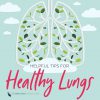Awareness and understanding
Did you know that chronic lower respiratory diseases—particularly Chronic Obstructive Pulmonary Disease—rank third in the leading causes of death in the United States currently?
Sadly, while over 12 million people in the country live with a COPD diagnosis, according to the American Lung Association, millions more are afflicted with the illness and don’t even realize it.
It’s crucial to understand and spread awareness of the potential warning signs, as people with COPD are more vulnerable to heart disease, lung cancer, and a plethora of other serious health issues.
Associated symptoms may include:
• Lingering cough
• Shortness of breath when exercising
• Chest tightness
• Frequent wheezing, hacking, and/or throat-clearing
• General inability to keep up with peers
Nature vs. nurture
So, how much are your lungs affected by your personal choices and lifestyle, and how much relates to your genetics? And to what degree does the greater outside environment impact your lungs’ health?
An individual’s susceptibility to pulmonary-related illness depends on a variety of different factors.
Unsurprisingly, tobacco smoking is the most common cause of pulmonary diseases. Additionally, secondhand smoke exposure, and even thirdhand smoke exposure (breathing in smoke residue left behind on walls, clothing, or other materials) can increase one’s chances of developing a chronic lower respiratory disease.
The Center for Disease Control provides some startling statistics, stating that nearly one in every five deaths in the United States is caused by pulmonary diseases related to smoking. Furthermore, the CDC writes that “More than 10 times as many U.S. citizens have died prematurely from cigarette smoking than have died in all the wars fought by the United States.”
As far as your genetics go, a family history of asthma can contribute to more serious lung conditions later on in life. Also, a rare, hereditary condition called alpha1 antitrypsin deficiency (also known as “AAT deficiency”) dramatically increases a person’s risk of COPD.
Overall, one’s susceptibility to COPD depends far more on nurture (environmental factors and behaviors) than on nature (genetics).
Tips for good lung health
While individuals aged 40 and older are at higher risk for developing respiratory diseases, there are various precautions that anyone can take for prevention, regardless of your age, gender, or ethnicity.
• Don’t smoke! And try to stay away from secondhand and thirdhand smoke, if possible.
• Avoid exercising near busy automobile traffic, because of the exhaust.
• Indoor pollution can be as harmful as what’s outside, so stay away from synthetic candles and air fresheners, and exchange them for natural scents, like essential oils. (But be careful which types of oils you use; however, as some can harm pets!)
• Keep your home clean and use natural cleaning products if possible.
• Dust and vacuum weekly.
• Exercise regularly.
• Be mindful of the type of pollutants in your workplace, and take relevant safety precautions. Some career fields, such as mining, construction, manufacturing, agriculture, health care (due to latex allergies), automotive repair, firefighting, and transportation, are more likely to wreak damage on lungs over time.
• Prevent infections by practicing good hygiene and keeping up with all important vaccinations, including annual flu shots.
• Utilize deep breathing exercises.
For more details, visit Healthline.
National Pulmonary Rehab Week
Given the vast number of people who deal with chronic lower respiratory diseases, pulmonary rehab plays a vital role in the health care system!
March 11th through the 17th is National Pulmonary Rehab Week, an observance that highlights the importance of—you guessed it—pulmonary rehab, especially within senior care communities. This week also aims to honor and express appreciation for therapists in that field of work. We at Consulate Health Care feel grateful for all the wonderful, skilled, and compassionate respiratory therapists throughout our family of care providers!
Make sure to let your favorite respiratory therapist know how much you appreciate them during this National Pulmonary Rehab Week.
If you found an error, highlight it and press Shift + Enter or click here to inform us.



